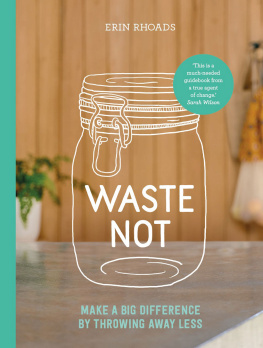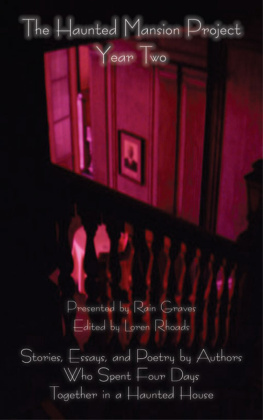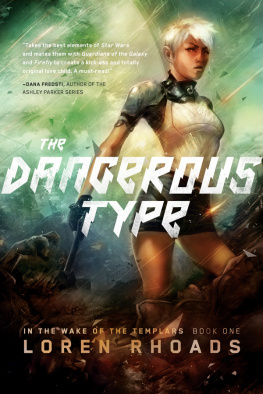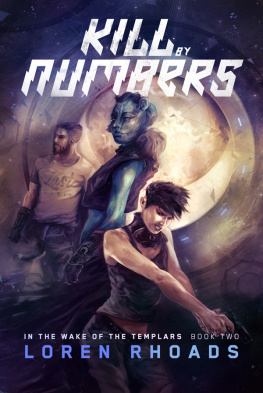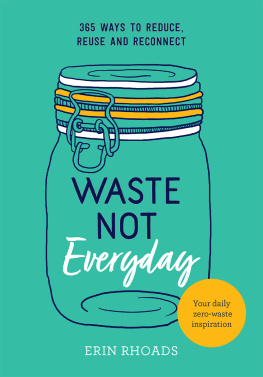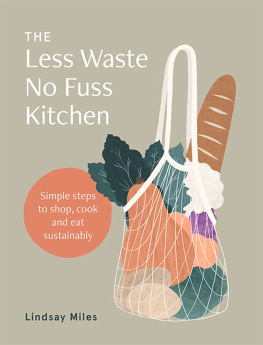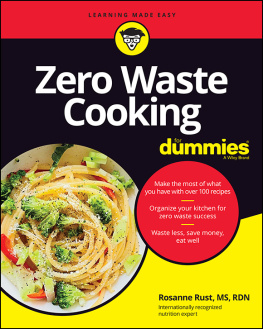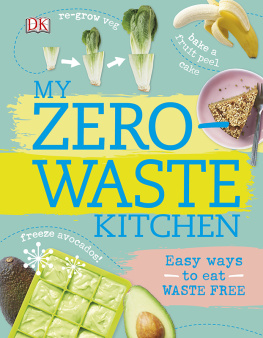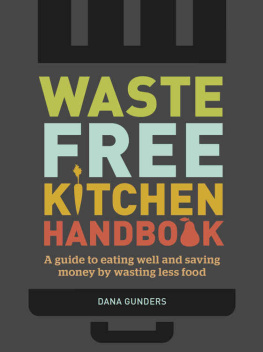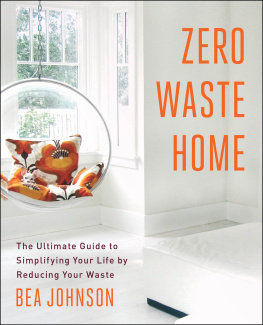Waste Not is a much-needed guidebook for those seeking tangible direction to live a better life. We all know deep down we must change our ways, and fast. Erin shows us how in the most truly responsible way possible by walking her talk out in front of the movement. Ive followed Erins campaigns and successes for a number of years, and she is a true agent of change.
SARAH WILSON
New York Times best-selling author of I Quit Sugar
I love being on holiday because you dont have to recycle.
The year was 2008; I was away on holiday with my extended family, indulging, as always, over Christmas week. I wish I could tell you that directly after making this statement the epiphany arrived that would start me on the journey to writing this book.
Alas readers, it did not. There were many years and many overflowing garbage bins until that particular moment came. Until then, I remained steadfast as an environmentally unfriendly and waste-unaware human being. When my holiday came to a close, my usual lacklustre recycling efforts returned. No-one, not even the person who reminded me of the proclamation I made above, could have predicted Id go from the poster girl for how to create rubbish to someone who would be asked to talk on the subject of reducing it.
It wasnt a lack of empathy that made me environmentally unconscious. There were other things on my mind; far more important things than what the arrows on the bottom of my plastic containers meant, or knowing where my rubbish went. If all this plastic and overflowing waste were an issue, I thought, surely someone would have fixed it by now? I also believed that if you cared about the environment you had to be a hippie. You couldnt buy heels or like wearing make-up. You wouldnt have a 9-to-5 corporate job and enjoy it. The very idea of watching an eco-documentary bored me. I revelled in the comfortable and convenient life; anything I needed was easy to obtain, wrapped in oodles of packaging that I threw away without a second thought. I was the sort of person who figured that if I tossed something into the recycling bin incorrectly, there was some kind of system in place that would locate the wrong items and remove them. And all the stuff I sent to landfill, well, it would break down eventually.
On reflection, I consider the height of my blindness to be one afternoon when I lived in London. Packing for a festival and in need of a two-person tent, I bought one for 15 from a large retail chain. I didnt think too much about where the tent came from, who had made it or why it was so cheap. All I knew was that it would serve its purpose for the festival and then Id probably leave it there. Someone would surely collect it and find a use for it, and I could always buy another one for a different festival. And I did, twice!
You might think Id be cringing at the memory of how wasteful I was, perhaps even chastising myself for my old environmentally unfriendly ways. But I dont really think thats fair. How could I blame someone, even myself, who didnt know better? A lot of us just arent aware of the issues around growing landfill sites, plastic pollution choking our wildlife or the threat of BPA. If youre not aware of the situation, how can you care enough to make a change?
I mentioned before how boring eco-documentaries are, or, at least, they used to be boring to me. But when my epiphany finally did arrive, it was because of an eco-documentary. It was the middle of June and I was home, sick. I lay in bed, my duvet wrapped around me, sniffling away, dreaming about moving to a small coastal town in North Carolina, when my phone rang. On the other end was my sister checking in to see how I was surviving the worst of head colds. I lamented being stuck inside, the boxes of tissues I was ploughing through, the dismal Melbourne weather and the fact that I had exhausted all my Nicholas Sparks movies. I asked if she had any inspiring movie suggestions; shed seen a movie called The Clean Bin Project and thought I might like it.
After we hung up, I watched the trailer. The premise was a project to not create any rubbish for a year, and part of that was to not buy anything new. I eyed the couple from Canada suspiciously; surely no-one could really avoid creating rubbish? But, with hours to kill until my boyfriend brought me my takeaway dinner, I settled in to watch a fellow redhead named Jen and her partner, Grant, battle it out for who could make the least amount of rubbish.
I never expected this documentary to become a catalyst for change in my life; it was only meant to fill a gap in my afternoon while I convalesced in bed. But my eyes were opened to how much devastation is caused by our throwaway consumer lifestyle. In particular, it was the footage of the Laysan albatross a bird that I had never so much as even heard of that left me in tears.
These majestic birds travel to Midway Atoll to become parents on a small stretch of land close to Hawaii. The atoll is not very big, so thousands of birds perch side by side with their young. Sadly, space is the least of their issues; the main threat is plastic. The atoll is in close proximity to the Great Pacific Garbage Patch, where the oceans currents bring together plastic debris in an area estimated to be about the size of New South Wales larger than the size of Texas. This is where the adult albatross fish for food for their chicks. Images show the water resembling a thick soup of broken plastic, making it hard for the birds to distinguish between pollution and food.

Adult albatross have no idea they are scooping up manufactured materials that take thousands of years to break down, because, as far as they are concerned, there is no such thing as rubbish. Returning to the atoll, they feed the food to their babies or retain it, stuck in their own stomachs. The babies die from starvation, their little bodies devoid of nutrients but with bellies full of bottle tops, toothbrushes and lighters that they are unable to regurgitate. Thousands of kilograms of plastic are brought back to the atoll by the adult birds every year.
The images of baby albatross stomachs bloated with plastic left me feeling uncomfortable. For days afterwards I couldnt stop thinking about the movie. While I used a lot of plastic, I always put it in a bin; I never purposely polluted or threw things into the ocean. But, for some reason, I now felt this wasnt enough. In a way I was still contributing to the problem by choosing to invest in plastic-packaged everything. My choices were akin to me saying, Yes, lets put more plastic into the ocean. I wanted to do something, but was unsure where to start. So I jumped on the internet, typing in the question How can I reduce my plastic use?
My internet search returned a host of websites, but the one that grabbed my attention was a funny little organisation from Perth, Western Australia, called Plastic Free July. I had heard of Dry July you know, the month where people give up alcohol while raising money for cancer research but not a month dedicated to living without single-use plastics. I read the site, learning in more depth some of the facts about plastic and how the choices we make every day can help make to create a more sustainable world.

